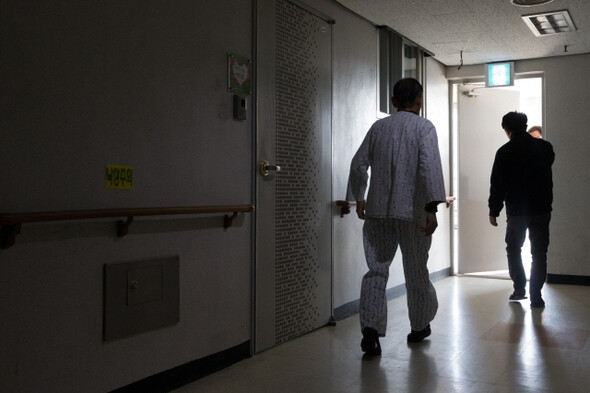hankyoreh
Links to other country sites 다른 나라 사이트 링크
AIDS patients pushed into unprepared national hospitals

By Choi Woo-ri, staff reporter
AIDS patients are being forced to national hospitals after the country’s only long-term home for them had its status revoked.
Faced with the sudden arrival of patients, the hospitals are proving understaffed and underequipped, with continued reports of prejudice and discrimination.
In late 2013, the long-term care center for AIDS patients in Gyeonggi Province had its status revoked after complaints of human rights violations. Following the decision, some of its 40 patients were transferred to national hospitals, with five going to the National Medical Center (NMC) and ten to the National Police Hospital (NPH).
Kwon Mi-ran, a member of the AIDS patient human rights group Nanuri Plus, explained the circumstances of the patients’ relocation.
“As patients get older, they require long-term care facilities, but none of the 17 metropolitan or provincial medical centers will take them, even if you inquire about it,” Kwon explained on July 1. “They say they can’t admit patients with communicable diseases according to the terms of the Medical Care Act, even though the communicability of AIDS is very low.”
“Under the circumstances, we should be grateful the national hospitals are taking them at all,” Kwon added.
Nineteen hospitals around the country are currently taking part in a Korea Center for Disease Control and Prevention (CDC) clinical support project for HIV-positive patients. The project “pledges” nine national hospitals - including the NMC and NPH - and ten large general hospitals to treat AIDS patients.
But with treatment focusing mainly on emergency patients with severe symptoms, others who are in relatively good health but need long term care because of their age are left with nowhere to go.
“I’ve been looking for different medical centers around the country, and I couldn’t find any,” said Kim Jong-guk, an official with CDC, adding that the center was considering designating a new living facility near a hospital in North Chungcheong Province.
The national hospitals have also turned out to be unprepared for the AIDS patients. In response to an inquiry from New Politics Alliance for Democracy lawmaker Jin Sun-mee, the National Police Agency and NPH said the hospital had established a policy of encouraging severely ill patients to use its intensive care and infectious disease units to make use of the empty beds. It applied to add twenty beds to the program as part of the CDC project. Currently, the CDC and other sources provide an average of 30 million to 35 million won (US$29,700-34,600) a year in treatment costs per person.
But the evidence suggests staffers are not being properly trained to care for the patients. It was only on June 24 - two weeks after their admission - that the director of the infectious disease unit held staff education on infection prevention.
Reports of discrimination and prejudice against patients have also surfaced. On June 18, two patients admitted to the NPH were refused additional dental treatment. Patients have also been denied rehabilitation treatment. According to one report, a patient who had been able to stand and walk before admission was unable to receive physical therapy for two weeks, resulting in their movement impairments returning.
Meanwhile, the men’s bathroom near the ward had its entrance sealed off and was replaced with another on the opposite side. Men’s urinals were installed at the end of the women’s bathroom.
“We don’t have a lot of physicians in the dental and rehabilitation units, so the wait times are quite long,” the hospital explained. “As for the bathrooms, we added separate ones for the patients’ own convenience, since they’re likely to have weaker immune systems.”
AIDS patient support group representative Son Mun-su said the prejudice stems from “a strong tendency for people to still view AIDS as a contagious disease rather than the chronic condition it is.”
The CDC said it plans to invite an outside speaker to the NPH to provide additional education on AIDS patients.
Please direct questions or comments to [english@hani.co.kr]

Editorial・opinion
![[Column] The miscalculations that started the Korean War mustn’t be repeated [Column] The miscalculations that started the Korean War mustn’t be repeated](https://flexible.img.hani.co.kr/flexible/normal/500/300/imgdb/original/2024/0630/9717197068967684.jpg) [Column] The miscalculations that started the Korean War mustn’t be repeated
[Column] The miscalculations that started the Korean War mustn’t be repeated![[Correspondent’s column] China-Europe relations tested once more by EV war [Correspondent’s column] China-Europe relations tested once more by EV war](https://flexible.img.hani.co.kr/flexible/normal/500/300/imgdb/original/2024/0628/7617195640940814.jpg) [Correspondent’s column] China-Europe relations tested once more by EV war
[Correspondent’s column] China-Europe relations tested once more by EV war- [Correspondent’s column] Who really created the new ‘axis of evil’?
- [Editorial] Exploiting foreign domestic workers won’t solve Korea’s birth rate problem
- [Column] Kim and Putin’s new world order
- [Editorial] Workplace hazards can be prevented — why weren’t they this time?
- [Editorial] Seoul failed to use diplomacy with Moscow — now it’s resorting to threats
- [Column] Balloons, drones, wiretapping… Yongsan’s got it all!
- [Editorial] It’s time for us all to rethink our approach to North Korea
- [Column] Why empty gestures matter more than ever
Most viewed articles
- 1[Column] The miscalculations that started the Korean War mustn’t be repeated
- 2Dreams of a better life brought them to Korea — then a tragic fire tore them apart
- 3Yoon echoed conspiracy theories about Itaewon disaster, former National Assembly speaker says
- 4CIA record confirms US ‘completely destroyed’ Seoul’s Haebangchon in 1950 bombardment
- 5Son Heung-min’s father, brother accused of child abuse at football academy
- 6S. Korea joins US, Japan for first multi-domain drills at a time of escalating tensions
- 7[Correspondent’s column] Who really created the new ‘axis of evil’?
- 8South Korea creates more US jobs via direct investment than any other county
- 9[Editorial] It’s time for us all to rethink our approach to North Korea
- 10[Column] Balloons, drones, wiretapping… Yongsan’s got it all!